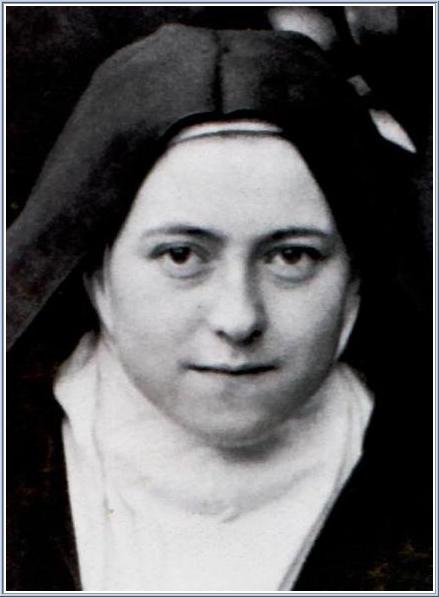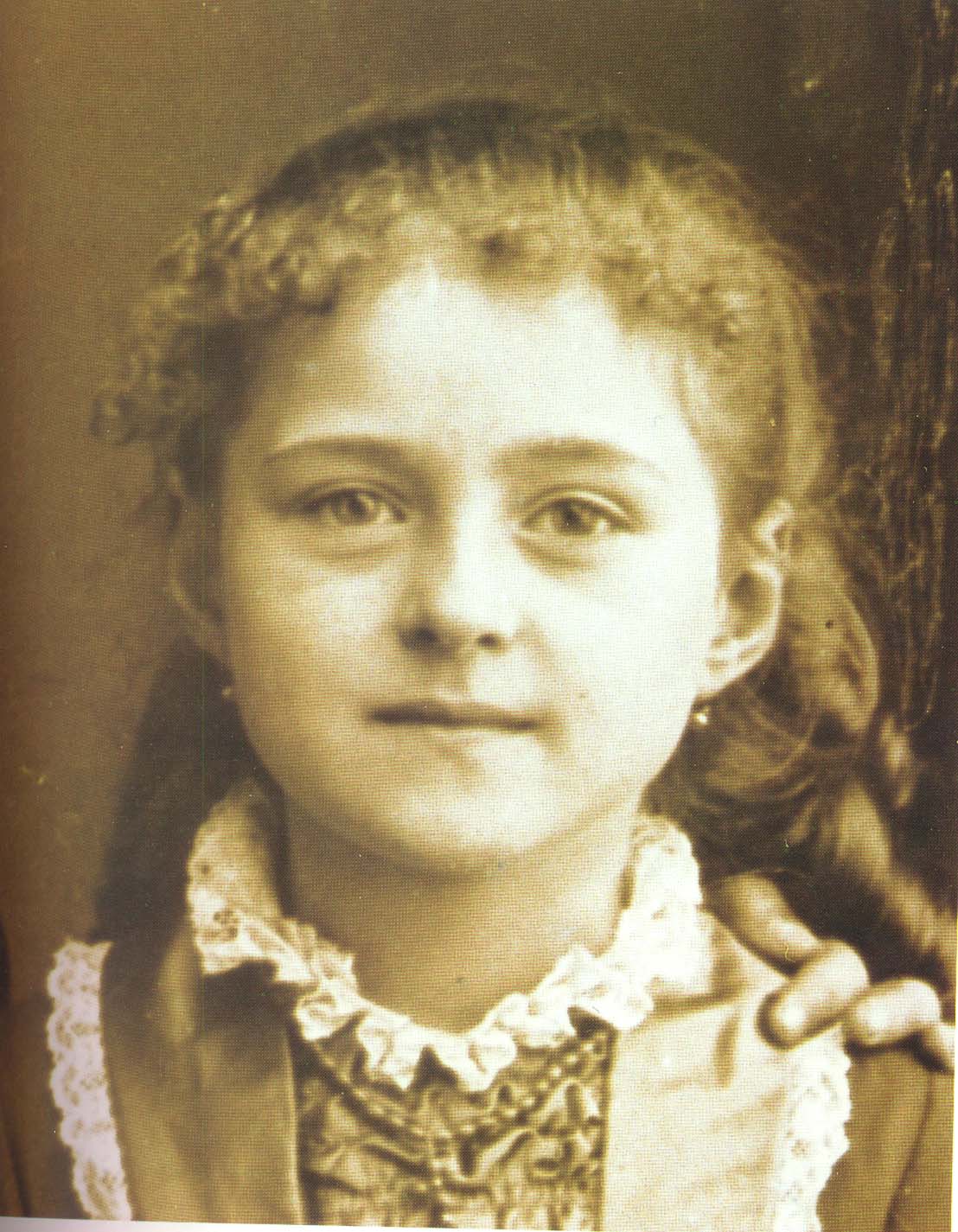 It is with great happiness, then, that I come to sing the mercies of the Lord with you, dear Mother. It is for you alone I am writing the story of the little flower gathered by Jesus. … It seems to me that if a little flower could speak, it would tell simply what God has done for it without trying to hide its blessings…. She knows that nothing in herself was capable of attracting the divine glances, and His mercy alone brought about everything that is good in her. St. Therese of the Child Jesus
It is with great happiness, then, that I come to sing the mercies of the Lord with you, dear Mother. It is for you alone I am writing the story of the little flower gathered by Jesus. … It seems to me that if a little flower could speak, it would tell simply what God has done for it without trying to hide its blessings…. She knows that nothing in herself was capable of attracting the divine glances, and His mercy alone brought about everything that is good in her. St. Therese of the Child Jesus
Marie Francoise Therese Martin penned these words when she was only twenty-three years old. Her humility and spiritual maturity are evident in these words. Sister Therese would live for only one more year after this. All of her life she was far above the average in maturity and it seems sad that the Lord called her to Heaven when she was only twenty-four years of age, but she left a legacy that has impacted many thousands of lives.
Born on January 2, 1873, she was the daughter of Louis Martin, a watchmaker and Zelie Guerin Martin a lace maker. Both had sought a religious life and both had been turned down because of lack of education. They brought their intense love of God into their marriage and raised all of their children with high standards. They had nine children but only five girls survived: Therese was the youngest.
God sent Therese challenges right from her birth. She was only two weeks old when she nearly died from intestinal  troubles. At three months Therese was so ill that her mother had to entrust her to a nurse for her care. Therese was with this kind woman for nearly a year. She put on weight and thrived. Upon returning home this blond, blue-eyed precocious child soon became the pet of the family. She was spoiled, had outbursts of temper, and was stubborn, but her family was so thrilled to see her again that they devoured her with kisses.
troubles. At three months Therese was so ill that her mother had to entrust her to a nurse for her care. Therese was with this kind woman for nearly a year. She put on weight and thrived. Upon returning home this blond, blue-eyed precocious child soon became the pet of the family. She was spoiled, had outbursts of temper, and was stubborn, but her family was so thrilled to see her again that they devoured her with kisses.
While many children that were so pampered would have become self-centered and difficult to live with, Therese realized that she was blessed by God. She later wrote, “All my life God was pleased to surround me with love, and my first memories are imprinted with the most tender smiles and caresses!” Truly from a very early age Therese had a deep spiritual sensitivity.
The Martin’s had a solid faith and saw the hand of God in every area of their lives. Their family life revolved around the liturgical year. Yet this family was not legalistic or bigoted. They practiced their faith in loving ways feeding abandoned children, tramps, and the aged. The children grew up with a lifelong respect for the poor.
Besides being gifted by God at an early age with spiritual sensitivity, there were two incidents that contributed to Therese’s maturation. When Therese was only four years old, Madame Martin succumbed to breast cancer. Therese’s older sisters sheltered her throughout their mother’s intense suffering, but Therese was present when her mother died. She watched from the corner of the room as her mother received the sacrament. Her father encouraged her to kiss her mother’s cold brow. On her way out of the bedroom she saw the upright coffin in the hallway.
Therese shed many tears but showing a spiritual sensitivity far above her years she realized that even this was from God. She understood God’s goodness and became more serious and devout. About this time Therese began to think seriously about devoting her whole life to service in a convent.
The other occasion on which Therese felt a strong calling from God was Christmas Eve, 1886. At thirteen years of age she was moving from childhood to adulthood and she says that she became an adult in a single instant. It seems that her father had put out the customary little shoes for presents at the fireplace. Going to the room to see what treats Father Christmas had brought her, Therese overheard her father saying that this would be the last time for such a silly tradition. Therese was stung by his words but now like a grown up she entered the room pretending nothing had happened. She later said that she experienced a complete conversion as she contemplated the meaning of her father’s words.
Soon Therese began to seek to enter the Carmelite convent at Lisieux. First she approached the bishop who told her she was too young. The Mother Superior also said she had to be a minimum of sixteen, but since this order was an order of Carmelites, closer to twenty or twenty-one would be better. How could this Mother Superior know that Therese was already mature enough to decide on her life?
Undeterred, Therese decided to take her case all the way to the Pope. She went on a pilgrimage to visit Pope Leo XIII in Rome. When she arrived at the Vatican she was told that it was forbidden to speak. The pilgrims were merely to kiss his feet, receive a blessing and move on for the next person.
Therese was sure of her calling and sure that the Pope was the only one who could get her into the convent at age 15. She needed his permission. When it was her turn to kiss his feet, she instead raised tear filled eyes to his face and said, “Most Holy Father, I have a great favor to ask you!” He responded that she would enter a convent if it was God’s will. She was prevented from speaking further by two guards who literally forced her from the room.
Nevertheless, she persisted with her father and with the Mother Superior in Lisieux and on April 9, 1888 she entered Carmel.
Life in convents is very closed to outsiders. We do not know much about Therese’s stay at the convent in Lisieux. Thanks to her autobiography we do know that Therese strived to serve God with all of her being every day.
Her heart was so sensitive that she would break down in tears if she offended anyone. One Sister used to clank her rosary beads very loudly when praying. It was such a distraction that Therese had a hard time concentrating and had bad thoughts about the nun. She repented and turned her thoughts into prayers for the sister. She also sought ways to serve the older nun and thereby learn to love her more.
 Therese believed that even the smallest acts of kindness fulfilled Jesus’ command to love one another. One day when reading in First Corinthians about the spiritual gifts that Christians receive for service, she came across Paul’s words, “But earnestly desire the greater gifts. And I show you a still more excellent way” (I Corinthians 12:31). She understood that the body of Christ was composed of many members, all with different calls to serve. She understood that, “Love comprised all vocations, that love was everything, that it embraced all times and places… In a word, that it was eternal!” These and many other insights into how to live a Christian life came her way as she studied God’s Word. The nuns at the convent realized how wise she was and encouraged her to write her thoughts down. She did so in the form of an autobiography.
Therese believed that even the smallest acts of kindness fulfilled Jesus’ command to love one another. One day when reading in First Corinthians about the spiritual gifts that Christians receive for service, she came across Paul’s words, “But earnestly desire the greater gifts. And I show you a still more excellent way” (I Corinthians 12:31). She understood that the body of Christ was composed of many members, all with different calls to serve. She understood that, “Love comprised all vocations, that love was everything, that it embraced all times and places… In a word, that it was eternal!” These and many other insights into how to live a Christian life came her way as she studied God’s Word. The nuns at the convent realized how wise she was and encouraged her to write her thoughts down. She did so in the form of an autobiography.
Therese composed her manuscripts during the last years of her life. She was ill much of the time and finally succumbed to tuberculosis in September of 1897. Within weeks of her funeral her manuscripts were published. Another nun had edited them and put them into one book.
Her book was sent to many convents where it was appreciated as great wisdom especially for one so young. Soon it spread throughout France. Eventually Therese was canonized on May 17, 1925 by Pope Pius XI. Three years later a young Albanian nun named Agnes Gonxha Bojaxhiu would take the name Teresa in honor of Therese of Lisieux. This nun would go on to exemplify the love that Therese of Lisieux taught. We know her today as Mother Teresa.
Thousands of people have been blessed by reading the autobiography of Therese of Lisieux. Readers have learned that small acts done faithfully for Christ are the most important. The everyday, ordinary Christian will never become famous. Each one of us is only called to serve God in a simple practice our own vocations in the way of love.

